Archpriest Professor George Mitrofanov is the dean of the Faculty of Church History within the St Petersburg Theological Academy and specialises in the history of the Russian Church in the 20th century. He is the author of many articles and books on the subject: Istoriia Russkoi Pravoslavnoi Tserkvi 1900-1927 (2002); (“The History of the Russian Orthodox Church 1900-1927” (2000) ) and Rossia ХХ veka: Vistok Kserksa ili Vostok Khrista. Dukhovno-istoricheskii – fenomen kommunizma kak predmet issledovanii v russkoi religiozno-filosofskoi mysli XX (“20th Century Russia: the East of Xerxes or the East of Christ. Phenomenological Study of Communism From Spiritual and Historical Perspectives in Russian Religious and Philosophical Thought of the 20th Century” among others. Fr George’s lectures on the history of the Russian Church appear also in audio format. His latest, non-theological work Tragediia Rossiii: ‘zapreptnye’ temy istorii XX veka (The Tragedy of Russia: ‘Forbidden’ Themes in the History of the 20th Century) (2009) touched upon some of the most sensitive points in the history of Russian national and ecclesial self-identity, in particular opinions regarding those Russians who chose to fight on the side of the Nazis, the conformism of Metropolitan Sergius (Stragorodsky), B.N. Yeltsin, to name but a few of the controversial subjects. In Russia, the book inspired a most heated polemical debate and ensured Archpriest George Mitrofanov a place among the most quoted Russian Orthodox priests on the internet. Attracted by Fr George’s reputation and solid academic background, many readers were drawn to the idealized picture of the life of the ROCOR faithful which he presented in his work. This explains the warm reception, gratitude and support which his book received from the hierarchy of the Russian Orthodox Church Outside of Russia, whose appreciation amounted to an official letter of commendation.
Fr George, has there been a reappraisal of the history of the 20th century in Russia?
This is a very broad question. I believe this process began at the threshold of the 1980s and came to a stop at the end of the 1990s. To this day, the main question remains unanswered; we are still unsure which historical trajectory we are following – the Orthodox/national one, or the one engendered by the 70 year-old Soviet rule. The fact that our streets are an elaborate confusion of symbolism drawn from both histories, suggests that we have entered a new period of semi-truth.
I don’t know; perhaps in some situations, semi-truth is better than falsehood, but in others, semi-truth is more pernicious than frank lies. We have not managed to reappraise our gigantically complicated past on any deep, moral level, and this inability shows that our country has been destroyed to its very foundations. The man who has arisen from it can’t even be called post-Soviet; for him, Russian history finished with the 1917 revolution and is an alien construct. Yes, he might make some connection, much as the modern Arabic Egyptians see a connection between themselves and Ancient Egypt, but many Russians identify themselves firmly with the Soviet history.
Modern Russians have become alienated from their own pre-Soviet history in many different ways, from hankering after certain symbols, songs, memories to concentrating on external successes- the exploration of space, for example. I have to say that even Soviet history is gradually waning the common consciousness and is being replaced by a brand new society – a fusion of Soviet, pre-Soviet and contemporary models placed in context of mass consumption. It has to be acknowledged that the Orthodox element within this framework remains negligible, especially since there are moves to express the Orthodox faith as a new ideology, frequently of a communist-patriotic hue. As far as the church history is concerned, for many people the tandem figures of Stalin and Patriarch Sergius remain pivotal. We have not yet repented before God and ourselves of what actually happened to our country. Unfortunately, in these last few years, we failed to re-examine our history from any spiritual and moral standpoint and this, I believe, means that any thorough reappraisal is now impossible.
Do you think that following the unification of the Moscow Patriarchate and ROCOR, the Church Abroad can no longer have an active part in this process of re-evaluating the past?
I have said many times to the representatives of the ROCOR clergy that our union happened both too late and too rapidly. We no longer have enough resources – spiritual or intellectual – to have any real influence on what goes on in church life. Moreover, for many people, the union with ROCOR was not so much a unification of the two parts of the church, tragically fragmented by the events of the 20th century, as a joining together of the fragmented Russian world in which the Orthodox faith features merely as a symbol of the national and cultural identity.
ROCOR has always tended to emphasize the spiritual aspects of Church life – at times rather conservative ones. Indeed, while acknowledging the place of nationality and politics in church life, you never lost sight of the traditional spiritual aspects. We received from you not only the books of Protopresbyter Michael Polsky, but also the works of Sts Ignatius (Brianchaninov) and Theophan the Recluse. By contrast, many contemporary Orthodox Russians value the Church only to the extent that it is a force for unity in the Fatherland and a source of the country’s strength. In the same way, many see the unification of the Church as simply a process whereby the diaspora get to join with the contemporary post-Soviet Russia and that is all. Few have any desire to return to the spiritual sources of the Church Abroad, so we’ll attend concerts together and listen to “God save the Tsar” followed by “The Rivers of Babylon” and “Katiusha” and think how we have this new Russian unity. This does not mean that we have formed a deep and specifically spiritual identity. So, I repeat, while no one was particularly against our unity, many people regarded it as a cultural and political process, rather than an ecclesial matter.
Yet, there is no ecclesial alternative to ROCOR. Based on the logic of your book, those factions who have rejected the unification process are continuing the struggle of the White Army and the civil war, which, according to President Putin’s speech in May 2007, was brought to an end by the act of the unification of the two parts of the Russian Church. What is your take on the matter?
In my time, I took an active part in the preparation of the unification process which I regarded as inevitable. On the one hand, this step was perhaps taken rather hastily, but on the other it came too late. It would have been vastly easier had the reunification taken place in the beginning of the 1990s. My opinion is based on the following facts. In 1920, the White movement suffered a major military and political defeat in Crimea and the Russian Far East, and this had to be acknowledged. On the other hand, a political and military defeat does not equate to a spiritual failure. The Russian diaspora, in effect, the cultural diaspora, was creating an alternative Russia, an alternative focus for the struggle against the spiritual impurity that had infected Soviet Russia. This makes the diaspora’s heritage of lasting value which sadly little in demand here in Russia.
Following the collapse of the Russian empire, it was the Church that in a mystical and providential way emerged as the main unifying factor in the opposition to the atheistic communist regime that came after. Unfortunately, by the 1930s, the Church adopted the so-called servile policy which, while, preserving the administrative structure, was responsible for many loses in church life. Meanwhile, the Church Abroad had its own temptations, trials and disappointments. That’s why, it would have been better if we had united back in 1991, when our efforts to build up Russia were just starting. We should have put our new freedom to minister and to preach to good use by quickly uniting ourselves and then working together in awakening Russian church life on all levels. Here, we lost a lot of time.
However, we mustn’t overlook the fact that the union of the Church Abroad with the Moscow Patriarchate returned ROCOR to the fullness of Orthodox Communion. Nowadays, Orthodoxy Is suffering from a deep crisis. Orthodoxy is not advancing in the world; in many ways it can be said that we are experiencing a universal defeat. For this reason alone, all those who feel responsible for the well-being of the world Orthodoxy as a whole, not just the Russian Orthodox world, should be united.
As I see it, those groups who were against the union, substituted political ideology for church sense. We have these people in our midst too – those who hold on to the Sergianist dogma, view ROCOR from a political rather than ecclesial standpoint. However, as a rule, these people don’t chose to leave the Church. But I am certain of one thing: in their extreme forms both “sergiansm” and “anti-sergiansism” is a political ideology which in itself is a dead-end. For this reason, those who have rejected our union have also condemned themselves to becoming a religious political sect, as we see happening now.
Now I have a few questions to ask about your book Tragediia Rossii. I would like to thank you for your position, namely your appeal to the reader to follow a moral ideal in the manner of the White movement. You quote from Fr Alexander Schmemann’s Diaries, in which he says that Solzhenitsyn is in love with his own invented Russa. I feel that your identifying Vlasov’s campaign with the White movement also falls in this category, i.e you are writing about a White movement which is yours alone. I believe that this identification lacks historical analysis and that you tend to idealize your heros, with A. V. Kartashev’s support for the White terror being just one example. How could you justify this iconographical approach to history?
I agree that in many of my articles and addresses which are gathered together in this book, I ceased to be a historian in the strict sense of the word and temporarily adopted a publicist stance. It is true that I hold many of the people who feature in these articles in great esteem and indeed, their historical defeat fills me with regret. I stress that, as a historian, I am conscious both of certain extremes in their position and also a lack of disinterest in mine. However, for a publicist, a personal view, a sense of personal responsibility and a moral standpoint are important which makes some bias on the part of the author inevitable.
My personal view of Vlasov is quite critical; I have much more sympathy with people such as General Trukhin and Meandrov. I was not so interested in Vlasov’s personal followers as in the movement as a whole. I immersed myself in the spirit of the 20th century and thought many times that if I had been alive at the time, I would have acted ‑ perhaps mistakenly ‑ in the same way as the people in my book.
I am particularly fond of Denikin. This said, I understand that from a military standpoint, General Vrangel was more successful. But if had found myself in Denikin’s place, I too would have committed myself to the absurd and ill-conceived march on Moscow. Of course, if I had been a member of the White immigration, I wouldn’t have agreed to collaborate with the Germans, but if I had been a Soviet man living at that particular time, I would have joined the Vlasovites without any hesitation. And this is what makes the Russians and the Soviets such different species. The White immigrants regarded themselves as still belonging to the Russia of the past and rejected any thought of compromise. The Soviets, on the other hand, knew much more about communism than they did about the White immigration. You had to have lived through all the horrors of the revolution, the collectivization, the terror, to understand exactly what communism was about. They were desperate, but as yet ignorant of what Nazism stood for, and, as such, were prepared to collaborate with anyone to save Russia from Stalinism. This is what made them join the Vlasov movement; they were all different people with no uniform understanding of the unfolding events. I understand this perfectly well; as a Russian man, I would have acted one way, but as a Soviet man who hates communism, I would have behaved completely differently. And this is the whole tragedy of history. And it’s impossible to say how correctly any historian would act were he to find himself within the historical period which he is examining. And it is precisely this element of bias ‑ the inevitable enthusiasms and errors which can be seen in this book ‑ that convince me that no historian who is writing about any topic dear to his heart can hope to avoid the mistakes and extremes of his beloved subjects.
You create a dichotomy between all things Russian and Soviet but don’t you think that if you follow this logic, you should also make a clear separation between the “Tartar” and “post-Tartar” periods? “Sovietism” is just one period of many within Russian history. In the emigration circles, it is customary to juxtapose the “Russian” and the “Soviet”, but I feel this kind of vision limits our understanding as to where exactly the “Soviet” period came from, and that it is a continuation of the preceding period.
Without a doubt. The main question facing historians and priests is this. In the 1990s mostly, we really wrestled with the questions around the persecution of the Church and were able to describe the forms this persecution took. With many archives now accessible, the picture became clear. What is less clear is this, why did this persecution happen in the first place?
The persecution happened as a result of some very dangerous spiritual tendencies which were prevalent in Russian historiography at the beginning of the 20th century, just as they were there at the beginning of the 18th and even the 16th centuries. That’s why the causes of the persecution of the Church can be understood only in the context of the preceding historical periods.
The periods of the pre-Mongolian Rus and that of the Russian Empire can be described as the bright spots of Russian history, whereas the Muscovite and the Soviet periods actually share many common characteristics. Both of these periods were characterized by certain negativity ‑ the very problems that the Russian Empire had tried to overcome.
Now I would like to address the question about the causes for the persecution. What historical responsibility can the Church assume for this persecution? Remember the prophetic words of Metropolitan Kyrill (Smirnov) in the course of his conversation with Patriarch Tikhon. The Patriarch was trying to explain the reasons for his various comprises by saying that he could not forget about the imprisoned hierarchs. In answer to him, Metropolitan Kyrill said, “Don’t think about us, Your Holiness. Prison is all we are good for.” These words are seen as a mark of his humility, but it is more than that. We see that one of our greatest hieromartyrs acknowledged the responsibility that the Church bore for the unfolding events, the responsibility of pastors whose flock had chosen a wrong path. In our church life today, this question may well be the key one for us, but we practically never ask it. On the contrary, any attempt to pose this question meets with instant resistance, “We have the Assembly of New Martyrs! Yes, we experienced fearful persecution,but look how many new martyrs we gained!” No questions asked. No mention, for example of the crucial fact that the new martyrs were vastly outnumbered by their persecutors who were themselves baptized Orthodox Christians. And another thing; we lost our new martyrs – the best that we had in the Church – and were left with the worst who then became our leaders. So you see, the question of the Church’s responsibility for the persecution of Christ in Russia is a most pertinent one today. It is also the one we tend to ignore in the context of the universal euphoria of “Russia’s third baptism” and of “our resurrection”…
You write extensively about the revolution but less about the failings of the monarchy which had led to the revolution. I feel that without this, it is impossible to paint a complete picture.
My book, which is an anthology of different articles published in various places in the course of the last 9 years, cannot pretend to be a comprehensive examination of all pertinent questions. I am fully convinced that both the Church and the monarchy bear responsibility for what happened in Russia. In this, I hold to the non-determinist position adopted during the Civil War. This position can be criticized for its ambivalence but it embodied a certain moral rectitude, because, at the end of the day, the monarchy was greatly responsible for what happened in Russia. Of course, our criticism should be from a spiritual, rather than a vulgar social-economic standpoint.
I regard the 300-year-long period of the Romanov dynasty as the best period of the Russian history and I have the highest respect for the last Russian royal family. It pains me to speak of the responsibility which both the monarchy and the Church bear for the catastrophe that befell Russia. This is all the more so, because of the torrents of abuse unleashed on our monarchs and clergy during the Soviet rule in the propagandized Soviet historiographies. Nevertheless, we must still address the question, albeit from a different angle, in order to understand why all these things have befallen us.
Father George, how would you sum up the response to your book in the media and the internet? I feel that your have been successful in drawing attention to a number of taboo topics in Russian history and this is has been your book’s main achievement.
It is very important for me that the official Orthodox media such as Tserkovyi Vestnik (“The Church Herald”), Zhurnal Moskovskoi Patriarkhii (“The Journal of the Moscow Patriarchate”) and the official journal of the St Petersburg Diocese Voda Zhivaia (“The Living Water”) all printed favorable reviews of my book. On the other hand, highly influential but not officially endorsed media outlets such as the website Russkaia Liniia (“The Russian Line”) and the newspaper Pravoslavnyi Sankt-Peterburg (“The Orthodox St Petersburg”) mounted an aggressive campaign against me which amounted to real harassment. I made a conscious decision not to respond, because I had already said everything I wanted to say in my book. As a result, some mass media organizations, such as Russkaia Liniia, began to disseminate libelous information about me, and the nature of these allegations convinced the Church Abroad that my mistreatment was officially sanctioned, which was never the case.
I find it significant that, despite various appeals to remove me from the St Petersburg Theological Academy Department of ecclesiastical History, expel me from the faculty and even to do away with me altogether, I remained where I was, and even though the Patriarch visited our Academy, my book attracted no censure from the church authorities. My opinions expressed in the book ‑ opinions that many had disagreed with ‑ were never criticized either by the Metropolitan, or by the Rector of the Academy. All the same, the various mass media that had attacked me in the first place, were now implying that I was still under censure and this, in turn, led to the Bishops’ Synod of the Church Abroad issuing their statement about me. I am profoundly grateful to them for this, for I know of no other example of seven hierarchs expressing their concern over the fate of one priest. It was unexpected and most heartening.
After that, Russkaia Linia,one of the pillars of the patriotic-communist fanbase in Russia, ceased operating in its current form. This is also a significant development since all too many Orthodox Christians in Russia base their opinions on the information supplied by these mass media outlets.
I must also note that there were differences in the response by the St Petersburg and the Moscow Theological Academies. The website of our Academy took no part in the polemics; it published a single review from the Zhurnal Moskovskoi Patriarkhii, which was in any case favorable, thereby stating their position. However, I observed that some of the habitual bias in our church history which I have had cause to criticise, was also present in the MTA. At the same time, I was heartened to discern an ally and a collaborator in another Orthodox school, St Tikhon’s University of Humanities together with its rector, Archpriest Vladimir Vorobyov.
Father George, thank you for this thought-provoking interview. We hope to continue our conversation; many topics remain to be explored.

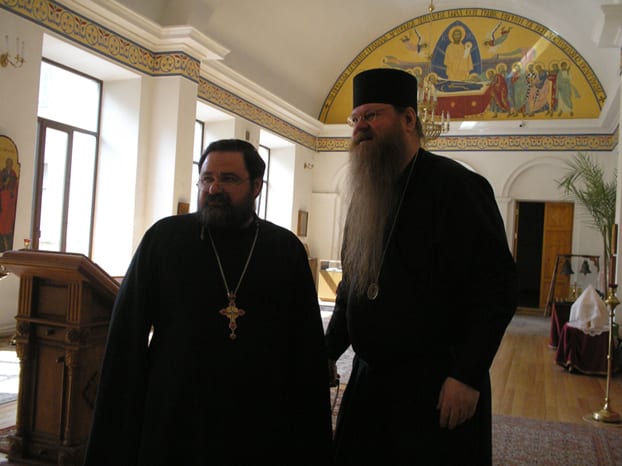

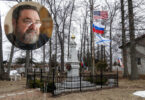
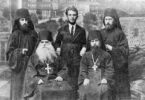
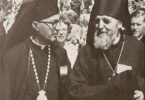
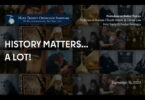
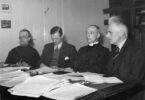



“Political Ideology in the Church Is a Dead-End” – No one was more political or ideological than the Prophets. The church is anti-modernist and deeply socialist (in its idealist, not materialist, forms).
Christ came to save all, including nations, economics, social life and our own cognition.
Are we concerned with justice? Well, then we’re concerned with ideology. What does justice mean? How do we know when a government is legitimate? In answering anything like that, you’re already treading in its waters.